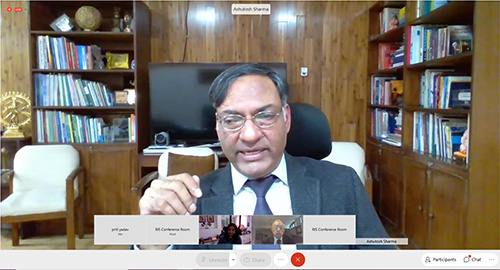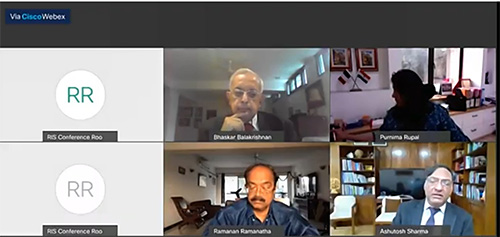 Department of Science & Technology (DST) Secretary Professor Ashutosh Sharma highlighted the importance of a multidisciplinary approach to address the challenges of the future at the 31st Science, Technology and Innovation Policy (STIP) Forum Lecture.
Department of Science & Technology (DST) Secretary Professor Ashutosh Sharma highlighted the importance of a multidisciplinary approach to address the challenges of the future at the 31st Science, Technology and Innovation Policy (STIP) Forum Lecture.
“Multidisciplinary approach is the foundation. The bifurcated disciplines are layers created just for our comfort. These can be demolished as they run out of steam,” Professor Sharma pointed out at the lecture on ‘The Art of Science in the Brave New World’ held virtually on 17th December 2020.
 He added that the future of science & technology is only about the convergence of different technology streams. “Though it is not possible to predict the exact product or technology that would arise in future, it is possible to predict the directions in which the technology would be going, based on how the minds of human beings work,” he explained.
He added that the future of science & technology is only about the convergence of different technology streams. “Though it is not possible to predict the exact product or technology that would arise in future, it is possible to predict the directions in which the technology would be going, based on how the minds of human beings work,” he explained.
“COVID 19 has reminded us that the disruptive changes are coming at us at an exponential rate. It is a brave world that we are living in today because we have to negotiate the change. In order to negotiate the changes of the new world, we need to negotiate the demands of the technology,” Prof. Ashutosh Sharma stressed.
He also emphasised on the necessity of sharing of information and knowledge, which is going to define the future for all times to come. "Industry 4.0 is about controlling the flow of data, information, and knowledge," he added.
 Mr. R. Ramanan, Mission Director, Atal Innovation Mission, Govt. of India presided over the session, Bhaskar Balakrishnan Science Diplomacy Fellow at RIS, New Delhi, Former Ambassador of India and Dr. Purnima Rupal Director CEFIPRA were also present at the lecture.
Mr. R. Ramanan, Mission Director, Atal Innovation Mission, Govt. of India presided over the session, Bhaskar Balakrishnan Science Diplomacy Fellow at RIS, New Delhi, Former Ambassador of India and Dr. Purnima Rupal Director CEFIPRA were also present at the lecture.
The monthly series of public lectures has been launched by the Science Technology and Innovation Policy (STIP) Forum to encourage public discourse on science, technology, and innovation policy in collaboration with the Indo-French Centre for the Promotion of Advanced Research (CEFIPRA), Research and Information System for Developing Countries (RIS), The Energy Resources Institute (TERI). Vigyan Prasar and India Habitat Centre (IHC).






























